The temperature was plummeting on Thanksgiving eve when Judith Zbiegniewicz wrapped herself in a blanket, picked up her phone and tapped out yet another plea for help to New York Guardianship Services. It was 2018, and for the previous five years the company, whose slogan is “caring that makes a difference,” had overseen nearly every major decision in her life, as it did for hundreds of New Yorkers deemed incapable by the courts of looking after themselves.
The organization had repeatedly maintained in court filings that Zbiegniewicz, who was 65 and suffered from depression and anxiety, was doing well under its supervision and that the Queens apartment it had placed her in was the “best and only place for her.” Each year, court examiners reviewed the reports and a judge signed off on their assessments.
In truth, though, Zbiegniewicz lived in squalor on the second floor of a dilapidated home whose roof had partially collapsed. She’d complained when her mattress teemed with bedbugs and when rats gnawed the legs of her kitchen chairs. Yet every month, her legally appointed guardian had taken $450 in compensation from her bank account as her living conditions deteriorated.
Now, with no heat and a cold front barreling down on the city, she stuffed bath towels under a door to block the draft and again appealed to NYGS.
“While you and every one at the guardianship are home in a warm house and having Thanksgiving dinner think of me. In a apartment without heat and can’t,cook. And rats in the kitchen,” she wrote on the evening of Nov. 21, 2018. “So much for where caring makes a difference.”
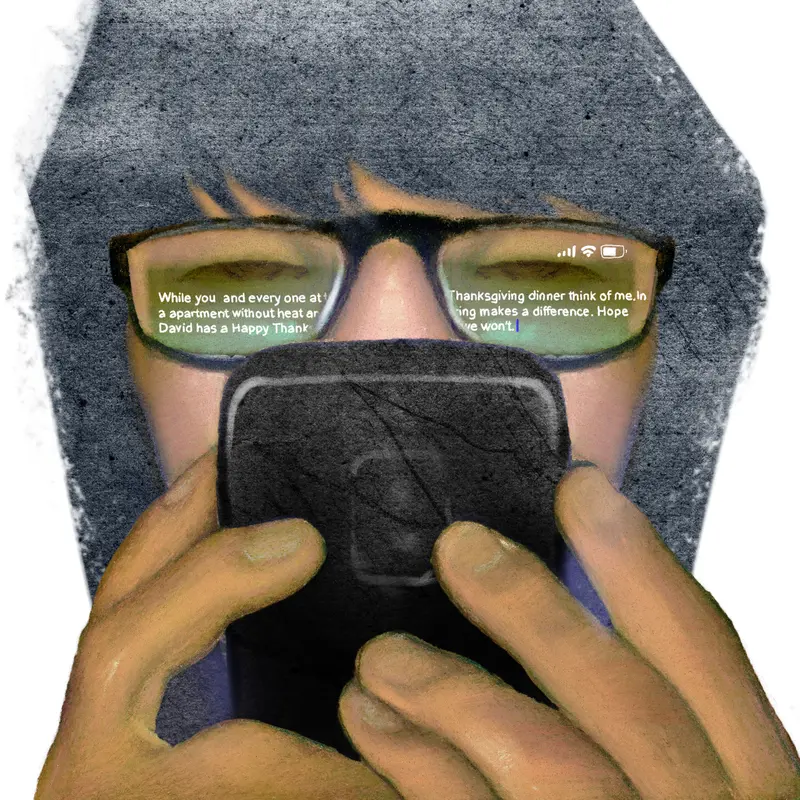
Three decades ago, New York was at the vanguard of a national movement to prevent such exploitation. State lawmakers passed progressive legislation to codify wards’ civil rights and maximize their independence. Under the law, guardianships were supposed to be tailored to the needs of the individual, with regular court examination to safeguard their welfare.
But today, the system is in shambles, leaving thousands of vulnerable New Yorkers sequestered, voiceless and forgotten while the officials who oversee their care struggle to ensure it, according to a ProPublica investigation. In New York City, there are just over a dozen judges to handle the 17,411 people in guardianships, data provided by the courts show. With that load, cases can sit for years without any kind of meaningful oversight. The hardest hit are poor New Yorkers like Zbiegniewicz, whom the state has entrusted to a network of loosely regulated nonprofits. The outcomes for some of these individuals — known in industry parlance as the “unbefriended,” because they have no family or anyone else to help them — have been dire.
In one case, a guardian didn’t notice his ward had died and continued to collect payments for the man’s care even after his death. In another, a guardian told the court in a report that they didn’t know where their ward was for a year. Case managers had visited her apartment but never went in. Eventually a utility worker discovered the woman’s corpse, covered in maggots, decomposing in her own bed.
That the 1990s reforms have failed has been an open secret for years among advocates, lawyers and judges, who have repeatedly called for an overhaul. But the state lawmakers and judicial leaders who have the power to improve it have not done so — even as cases like that of Britney Spears have brought national attention to the issue of guardianships.
ProPublica reviewed hundreds of pages of court records, interviewed dozens of lawyers and experts and talked to the wards who are least equipped to advocate for themselves. What we found is that some of the remedies that policymakers introduced 30 years ago to bolster care and curb abuse, like minimum qualifications for guardians and court examination of their reports, are in dire need of an upgrade.
Today, for example, it is far easier in New York to become a guardian than a nail technician. Parties need only complete a day-long course — far less training than is required in some other states, including California, Texas and Florida. And oversight of their work is similarly threadbare, consisting primarily of a court-appointed examiner who focuses almost exclusively on financial paperwork and a judge who signs off on the examination. But with thin ranks of reviewers, annual assessments can take years to complete. And officials rarely, if ever, see the wards in person.
The easy entry and lack of oversight, critics say, has helped attract unscrupulous nonprofits that take advantage of the wards they are supposed to protect.
In 2015, the chief financial officer of one nonprofit was convicted for stealing more than $50,000 from a ward’s accounts, government documents show. That same year, state regulators found that another nonprofit improperly loaned its top officials more than $250,000 while wards were unnecessarily kept in nursing homes.
Today, even those who helped write the state’s main guardianship statute, known as Article 81 of the Mental Hygiene Law, concede the yawning gap between its promise and its practice has rendered it, in the words of one, “basically pointless.”
“Keeping people out of guardianship in the first place is the single most important thing to do, because once you’re in it, it’s the toilet you get flushed down,” said Kristin Booth Glen, a former judge who helped craft the law and has called for reform for years. New York’s oversight of guardianships has been “a total and utter disaster,” she said.
Few groups illustrate the consequences of that failure better than NYGS, the organization that was supposed to care for Zbiegniewicz. Over the past decade, the company has grown to become one of the largest providers in the business, drawing $450 in monthly compensation each from hundreds of wards’ accounts while providing as few services as possible, according to court documents and six people familiar with the company’s operations, including former employees.
“Everybody is shirking responsibility,” said Carla Billini, the former director of case management for NYGS. She resigned last April after a decade in the job, saying she was fearful that the company’s practices would result in harm to wards. “How is there nobody above the guardian who watches all the guardians?”
A spokesperson for the Office of Court Administration, which runs New York’s court system, said that judges face “extremely challenging circumstances” but do the best they can under the law. “The caseloads are extremely high and individual cases can persist for decades,” he said. “Yet, the courts never give up in searching for solutions to ensure the well-being of some of society’s most underserved populations.”
NYGS executives declined to be interviewed for this story. In a statement, Sam Blau, the company’s chief financial officer, said that as a fiduciary he was barred from answering questions “about any specific client.” However, he noted, “we are accountable to the Court and our annual accounts and reports are scrutinized by Court appointed examiners and any issues would be addressed.” NYGS did not answer written questions about the company’s broader business practices.
In his statement, Blau called ProPublica’s reporting “misguided, without full and proper context, filled with omissions and less than accurate information.” But when asked to specify his concerns, he did not respond.
Zbiegniewicz’s decadelong experience as a NYGS ward serves as a road map to how Article 81 fails New Yorkers who are least able to protect themselves.
“Somebody’s Going to Come Help Me”
Zbiegniewicz’s introduction to guardianship came as it does for thousands of others in the city each year: through a call to the city Adult Protective Services program by someone concerned about her well-being.
It was November 2008, and Zbiegniewicz was struggling financially and emotionally. Her father had died suddenly from a heart attack a year and a half earlier, leaving her the family’s Maspeth, Queens, home — and, to her surprise, a reverse mortgage. The outstanding debt was $266,532.95.
Zbiegniewicz had no job and no way to pay. She had been dependent on her father all of her adult life, the result of an early trauma: At 18, she was raped leaving the subway on her way to work at Queens’ Welbilt Stove plant. Her world became small, as her devastated parents shielded her. She never sought therapy, never returned to work and rarely ventured beyond the comfort of her block.
Now, with the house in foreclosure, someone called the city to check on her. Adult Protective Services soon sent a psychiatric nurse practitioner, who diagnosed Zbiegniewicz with depression, anxiety and a dependent personality disorder. In a court petition, the city noted that she relied on food stamps and public assistance. With bills piling up, she had just $459.88 in her bank account.
So on a January day in 2010, to help Zbiegniewicz stave off eviction, a city lawyer walked into a wood-paneled courtroom in the state Supreme Court building in Queens and asked a judge to declare her an “incapacitated person” in need of a guardian to manage her finances and housing.
Zbiegniewicz, who declined to attend the hearing, initially welcomed the move. “I was in no condition right then and there,” she said. “I was all alone, no direction, no nothing. I thought, ‘OK, somebody’s going to come help me get focused and leave.’”
The judge granted the city’s request, setting in motion Zbiegniewicz’s spiraling journey into New York’s overloaded guardianship system, which now contains 28,619 people statewide, more than 60% of whom live in New York City. In most cases, a judge selects either a so-called lay guardian — family or friends who volunteer — or a professional guardian, usually a lawyer, which can be pricey. For the thousands of New Yorkers like Zbiegniewicz, who have no family and too little money to be worth a professional guardian’s time, a judge will choose from just under a dozen nonprofit groups, depending on the circumstances. In cases where Adult Protective Services is involved, that means one of three publicly-funded organizations.
In Zbiegniewicz’s case, the judge initially appointed the Jewish Association for Services for the Aged. Its mandate was narrow: stopping her eviction.
The guardian negotiated the sale of Zbiegniewicz’s family home, paid off the reverse mortgage and secured $92,000 for her in the deal. Once the money was placed in a special needs trust, JASA’s mission was complete. The judge then turned to the list of professional guardians to help Zbiegniewicz find new housing.

But the task was a challenge. Zbiegniewicz insisted on keeping her five beloved schnauzers and living with four longtime friends who’d supported her after her father’s death. The arrangement made her a tough tenant to place, and by July 2013 she’d faced eviction from two separate apartments where she had withheld rent until repairs were made.
Before long, Zbiegniewicz’s professional guardian wanted out.
Like many private attorneys in the system, she was working the case pro bono, and her petition to be replaced reflected a larger strain in New York’s system, which has long relied on such goodwill to handle guardianships of the indigent.
Private lawyers have “stopped taking cases in droves because they don’t want to spend the time,” Arthur Diamond, the former supervising guardianship judge in Nassau County, told state lawmakers in 2018. “And it can be an immense amount of time being a guardian for somebody who has Alzheimer’s and dementia, which many of our wards do.”
NYGS pitched itself explicitly to the courts as a solution to this problem. A lawyer for the group once wrote to a Queens judge in a letter obtained by ProPublica that the company “hopes to fill a need in the court system” by taking those cases in which a judge would otherwise have “a difficult time finding a suitable guardian willing to act.”
In a July 2013 hearing, Zbiegniewicz’s private guardian suggested NYGS take over her case because “they seem to have a significant amount of resources.”
Supreme Court Justice Lee Mayersohn OKed the switch, making NYGS the third guardian to handle Zbiegniewicz’s case in three and a half years.
Exploding Caseloads, Little Vetting
The guardianship bill state lawmakers passed in the early 1990s established the first training requirements for guardians before they can serve — generally a daylong class meant to ensure they have a baseline familiarity with Article 81’s requirements. That’s less stringent than what the state requires of prospective nail technicians, who must complete a 250-hour course and pass tests. This low barrier to entry can allow a family member who steps up to help a loved one in crisis quickly get in place. But advocates say that New York’s permissiveness also enables exploitative actors to enter the guardianship business.
At the time of NYGS’ founding, Blau was working as the director of judicial compliance at another guardianship firm, according to his LinkedIn profile. The state attorney general’s office investigated that group, Integral Guardianship Services, during Blau’s tenure, and eventually accused it of abandoning its most basic duties, including filing annual reports detailing wards’ finances. (Blau wasn’t named in the probe, which the group settled. The firm shuttered its operations last spring.)
NYGS’ chief operating officer — Blau’s older brother David — had been running an unrelated e-commerce business, selling discounted travel coupons, according to former employees.
Once certified, private guardians are required to attest that they haven’t been found to have violated any criminal, civil or professional rules. Nonprofits, however, undergo no such vetting. In fact, they are not even required to provide proof of their charitable status.
Had there been such a requirement, the courts would have seen that NYGS is not registered as a charity with the state attorney general’s office nor does it have tax-exempt status from the Internal Revenue Service, both agencies confirmed. Nevertheless, the company repeatedly represented itself as a nonprofit in its court filings and promotional material as it took on more and more cases, including Zbiegniewicz’s.
The distinction is significant. Nonprofits are exempt from court rules that cap the number of cases and the amount of compensation guardians can receive annually. Such operations can be lucrative. One estimate commissioned by the state attorney general in 2016 projected that a nonprofit guardian serving 400 low-and-no-fee wards could generate $1.2 million per year.
Sam Blau declined to answer questions about the company’s tax status, but said in a statement that “a large percentage of our cases are done completely Pro Bono,” which “is certainly in line with our mission to help people of minimal financial means.”
In pitching the firm to the court, NYGS’ lawyer painted a picture of an organization with a “cadre of knowledgeable and caring individuals” experienced in guardianships who used “state of the art records management technology.”
In reality, the Blau brothers operated out of a cramped second-floor office on Avenue J in Midwood, Brooklyn, that was strewn with stacks of government forms, old checkbooks and financial statements. For years, employee chats show, the cremated remains of a ward sat in a plastic bag on the shelf of a hallway closet, nestled in a plain white container the size of a shoe box. The “state of the art” technology it used to manage its caseload were actually Dropbox and Google Docs, former employees said.
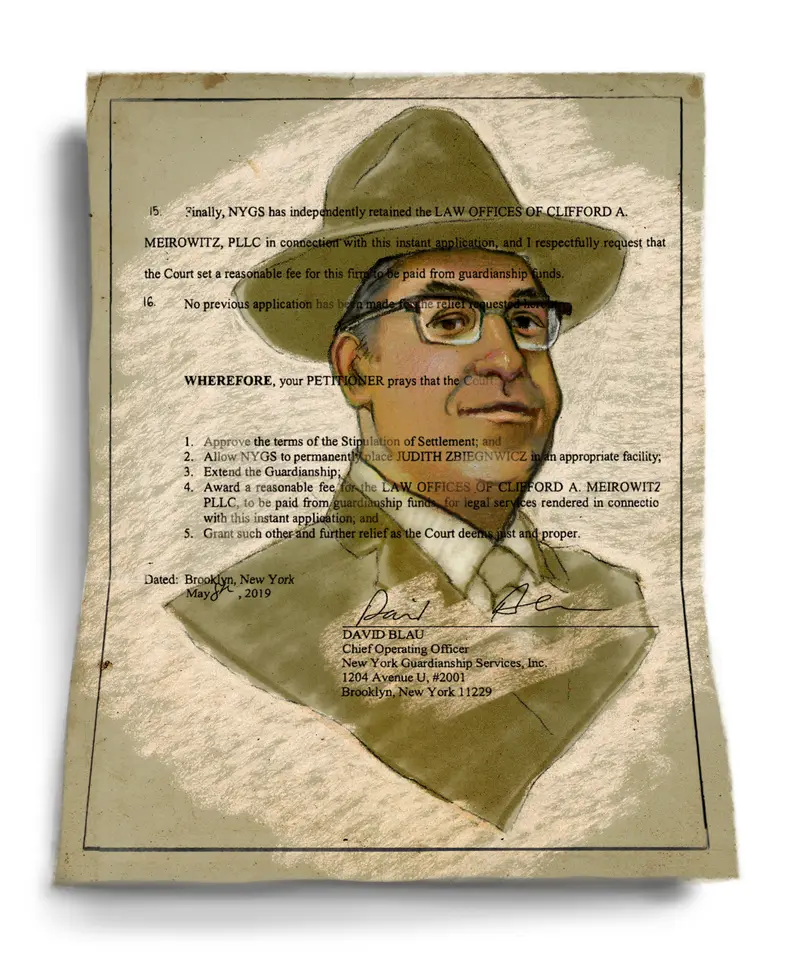
NYGS’s business grew rapidly by taking on dozens of new cases annually — a strategy that former employees said was intended to maximize profit on the $450 per month apiece it earned from most of its wards. But staffing didn’t keep pace with volume, and workers realized that in order to do the job well, the firm needed to take fewer cases and throw significant resources at the ones it already had.
That didn’t happen.
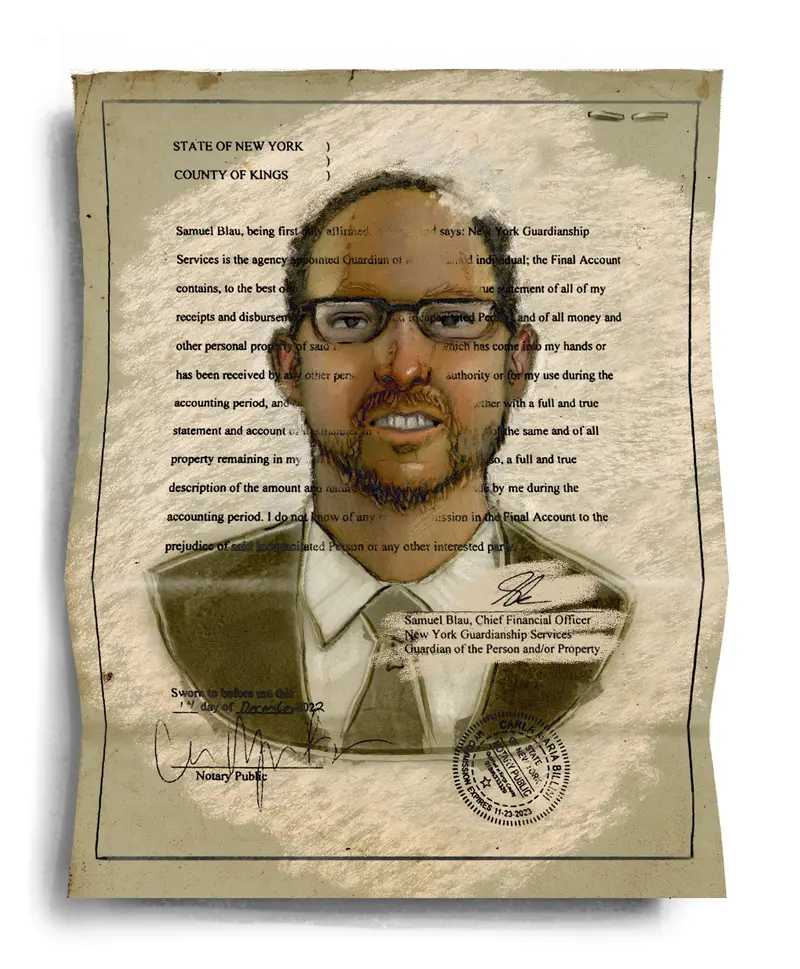
In 2016, when the company had 167 clients, it employed two full-time case managers, internal records show. That was true the following year when the total caseload jumped to 248 and remained the case the year after that, when NYGS was responsible for nearly 300 wards. Two more employees were hired in 2018 to handle wards’ finances. Several studies, as well as states including Virginia and Colorado, recommend a 20-client limit to ensure proper care. New York, however, has no equivalent guidance, and at one point NYGS had 83 wards per staffer, according to internal records.
More recently, former employees said, the company outsourced key jobs to workers in the Philippines who were expected to address the complicated insurance, banking and health care needs of vulnerable wards from 8,500 miles away. One worker told ProPublica that she was so troubled by the lack of resources and ceaseless calls — she was responsible for dozens of wards every day — that she quit after six months.
For years, unless judges specifically asked, they had no way to know whether nonprofits they assigned actually had the bandwidth to take on new cases. It wasn’t until last fall that the state court system, using a federal grant, created a database so that judges and court staff can “better oversee the flow and nature and structure of guardianship cases,” the courts’ spokesperson said.
Within NYGS, complaints about the conditions, the lack of resources or a ward’s specific problems were usually met with silence, said Billini, the former director of case management. Sam Blau would just “stare into his computer when you’d tell him something he didn’t want to hear,” she said. “We called it the passive-aggressive stare.”
The former case manager, as well as other workers, said this dynamic would play out time and again after NYGS moved Zbiegniewicz into the upstairs apartment of 150-15 Yates Road, a two-family home in a dangerous section of Jamaica, Queens. It was seven miles and a world away from the spacious Maspeth house where she’d lived most of her life.
Blau did not respond to questions about Billini’s account. In a general statement, he disputed ProPublica’s reporting, which he claimed was based on “disgruntled former employees who have a clear biased agenda.”
Bedbugs, Rats — No Questions Asked
Zbiegniewicz suspected something was amiss with her guardian from the start.
Shortly after moving into the Yates Road apartment, she discovered bedbugs. She said she complained to NYGS immediately, but it took three months before the company sent pest control. The disruption caused her therapist to cancel weekly sessions until an exterminator certified the insects were gone, Zbiegniewicz said.
“I was tore up from the floor up,” she recalled of the bites.
In its filings to the court, however, NYGS presented Zbiegniewicz as thriving. In language that would repeat year after year, a company social worker who visited the home wrote that “Ms. Zbiegniewicz is oriented to person, place, and time,” described the frequency of her therapy sessions and the medications she took, adding that she “enjoys gardening and taking care of her dogs and roommates.”
To ensure the integrity of such reports, the system includes a layer of protection for wards in the form of court-appointed examiners. By law, these individuals — typically lawyers or accountants — are tasked with reviewing guardians’ reports to “determine the condition and care” and finances of the ward, as well as “the manner in which the guardian has carried out his or her duties and exercised his or her powers.” In practice, the scrutiny can be far from robust.
Today, there are just 157 examiners responsible for reviewing the reports of 17,411 New York City wards, according to data from the court system. And their training can be minimal. In Brooklyn, Queens and Staten Island, this includes viewing a set of instructional DVDs that were recorded 12 years ago.
Like the cost of the guardianship itself, the price for these examinations is borne by the ward.
Zbiegniewicz paid a few hundred dollars each year for an examiner’s reviews. But her records show these examiners did not interrogate spending that indicated potential housing problems.
In 2014, for example, Zbiegniewicz’s account listed four separate disbursements — totaling $1,251 — for extermination, laundry and cleaning services, all explicitly labeled as bedbug remedies. Yet when the examiner asked whether the housing was “best suited” to Zbiegniewicz’s needs, NYGS said it was “appropriate.” There’s no indication in the file that the examiner at the time, Paul Guttenberg, pressed any further or followed up on the extermination expenses. Guttenberg, who declined to be interviewed and didn’t respond to emailed questions, approved NYGS’ report.
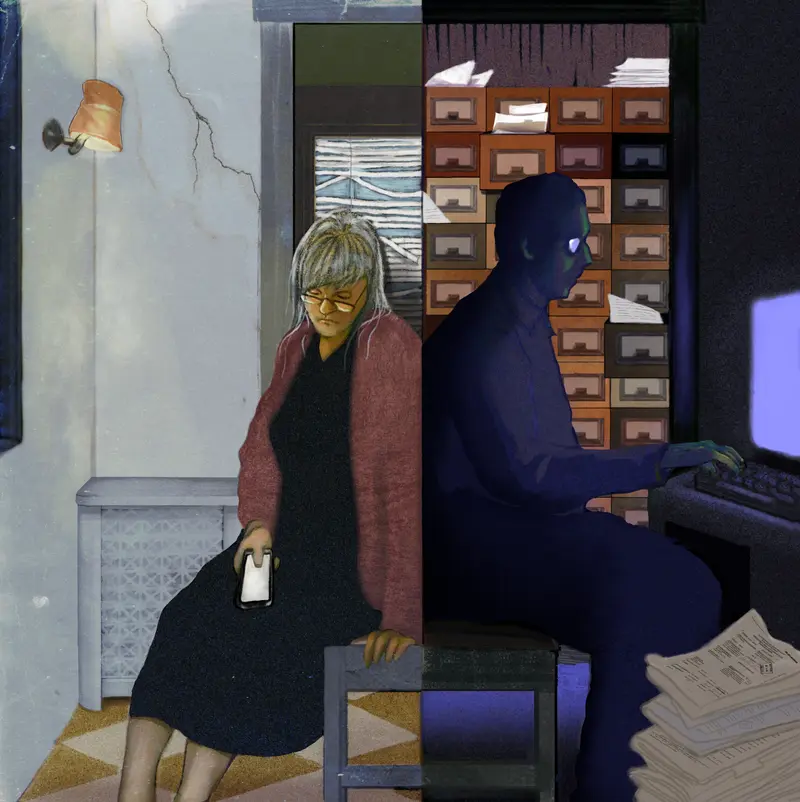
The subsequent examiner of Zbiegniewicz’s case, Janet Brown, was similarly uncritical. Court data show she carried a significant caseload. Zbiegniewicz was just one of 44 new cases Brown picked up in 2015 alone — a pace that would continue throughout the guardianship. Each year, after reconciling the financials, she signed off on NYGS’ reports, including those that showed Zbiegniewicz paying to address more problems a landlord would typically be expected to cover: $180 for electrical work in January 2018, then $30 more for an electric stove that May and $50 for a heater in December.
That year, when Brown asked whether Zbiegniewicz’s apartment was “best suited to her current needs,” an NYGS employee responded, “It is not the ideal placement, but currently it is the best & only placement” for her.
The employee provided no further explanation in the filing, and there is no indication in the court record that Brown asked for one.
Meanwhile, the conditions in the apartment steadily worsened, according to emails, court filings and interviews with four other people who spent time there.
“Now the rats are eating the kitchen chairs,” Zbiegniewicz wrote to NYGS in a March 2019 email. “By the time I leave I will not have anything to take.”
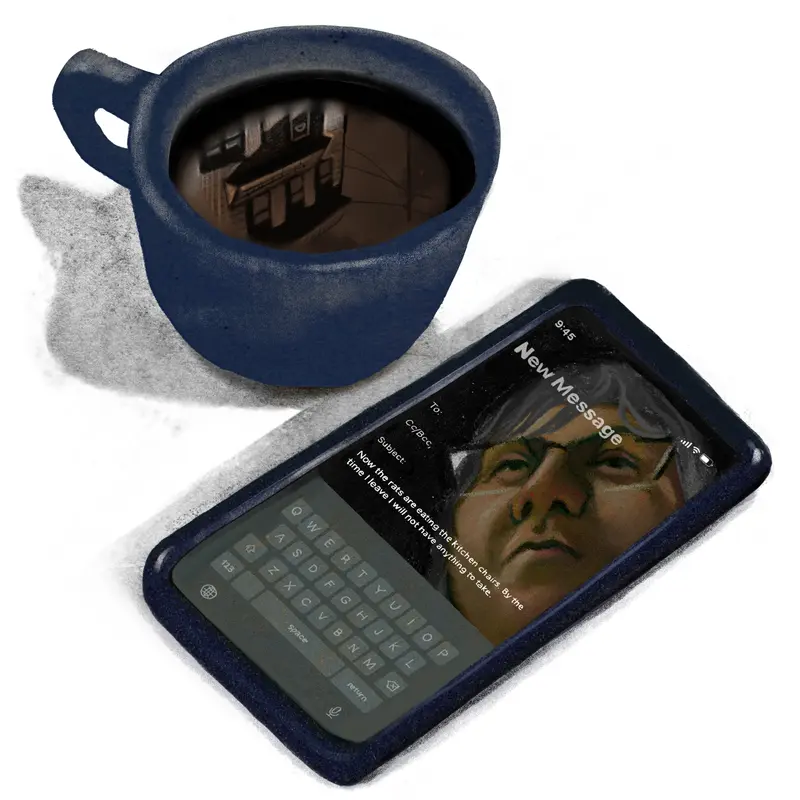
That year, the guardianship reported spending $280 of Zbiegniewicz’s money for “storage containers and pest Control,” as well as “reimbursement for Extermination and Bathroom Repair.”
There is no indication in the court records that Brown even examined these 2019 expenses. While Article 81 requires guardians to file wards’ annual accounts by May of the following year, there is no such deadline for examiners. Zbiegniewicz’s file is still missing reviews for four years of her guardianship.
In an interview, Brown said that her job was to “make sure the dollar amounts balance out” and that funds were not “being misused.” By those standards, there were no disbursements in the annual reports that “raised an eyebrow,” she said. She said she wasn’t aware of the chronic heating problems, the collapsed roof or the pest infestations in the Yates Road apartment, despite the expenditures for extermination and various capital improvements in the reports she reviewed.
“I would have had no way of knowing that unless someone directly reached out to me and said, ‘Hey, this is a problem,’” she said.
Brown didn’t respond when asked why she didn’t file her reviews for 2019 through 2022.
Zbiegniewicz said that for years she had no idea that she could take her complaints to the examiner. When she finally did phone, she said, Brown conferenced in a NYGS employee and left the call.
Brown, who is no longer an examiner, said she didn’t recall that conversation, but that she remembered Zbiegniewicz was vocal about her desire to be released from the guardianship. Brown said that she believed she discussed that with someone at NYGS but she couldn’t recall with whom or what was said.
“I do genuinely care,” she said, “even if you don’t think so.”
Experts said the failure to conduct face-to-face check-ins could hide horrific situations. Judicial leaders, they said, can and should bolster examinations with home visits. For example, in Davidson County, Tennessee, which includes Nashville, social services workers visit wards, review their medical records and interview guardians and their doctors.
“You’ve got to visit the person,” said Booth Glen, the former judge who helped write Article 81. “Paper is not enough when human lives are at stake.”
With Judges, “Things Just Get Locked In”
Examiners are the main check on guardians, but judges also review examiners’ reports before signing off.
Zbiegniewicz believed that if Mayersohn understood how dire her living conditions were, he would require NYGS to fix the situation. The son of a state assemblymember, he started his career as a legislative aide and practiced law for nearly two decades, focusing on trusts and estates, among other civil matters, before being elected to the bench in 2004.
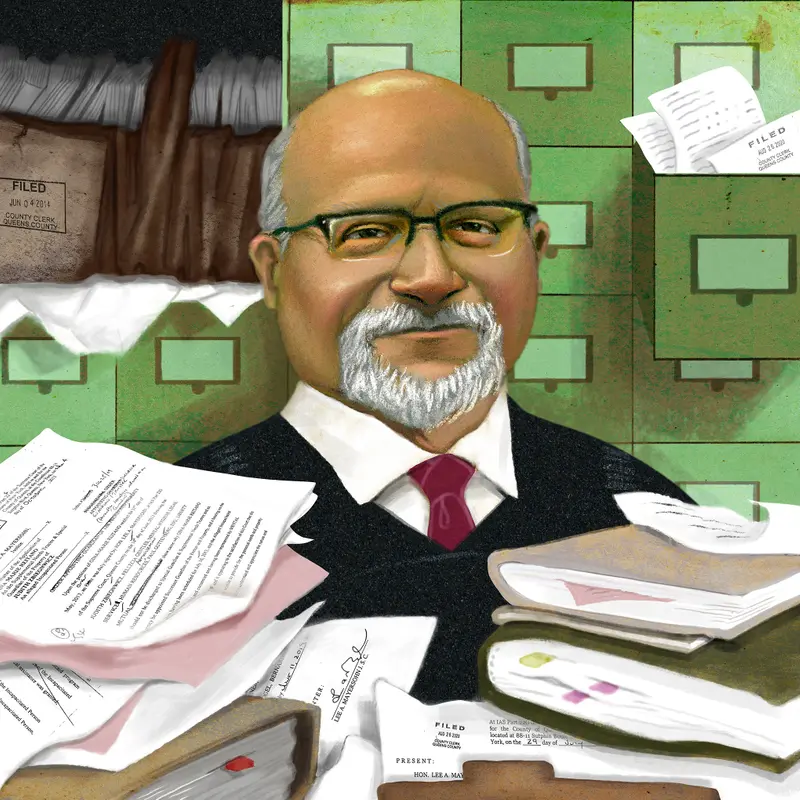
What Zbiegniewicz didn’t know was how long it could take for information to get to the judge — and how long it could take him to review it. She is just one of 1,566 open guardianship cases currently on the judge’s docket, according to court data. Such a robust caseload, coupled with too few examiners, can add years to the oversight process, creating dangerous gaps in information in cases like Zbiegniewicz’s.
For example, in the spring of 2018, NYGS submitted its guardianship report for the prior year, as required by law. The paperwork contained numerous indications that something was wrong at Yates Road. Notably, no rent payments were listed for the apartment and the company acknowledged for the first time that the house was “not the ideal placement” for Zbiegniewicz.
But a full year passed before the examiner filed her review with the court, where it was eventually checked by clerks and then passed to Mayersohn for approval. In all, the entire process took more than two years. None of the parties raised alarms over, or even noted, the missing rent payments.
Had they dug deeper, they would have found that Yates Road had gone through a foreclosure and been sold to a bank that was moving to evict Zbiegniewicz and her friends. It’s unclear who actually owned the house when NYGS moved her there; the deed had changed hands multiple times in quick succession. During Zbiegniewicz’s first two years in the house, the guardian had sent $32,000 of its ward’s money to a firm run by a Queens entrepreneur who was later convicted of real estate fraud in an unrelated case. When the eviction notice arrived, NYGS stopped paying the rent but appeared to do little else.
“Phone calls to the guardian in an attempt to work out some sort of reasonable solution have failed since the guardian has refused to respond to any call,” an attorney for the new landlord wrote in a December 2017 court filing. The company eventually hired a lawyer to respond to the landlord-tenant action.
For more than two years, while the official reports on Zbiegniewicz’s welfare crawled through the court system, NYGS kept her in the home.
During that time, she endured all manner of horrendous living conditions. According to her emails to NYGS, she went long stretches without heat and rats ate holes through her clothes. When the apartment lost power, she and her roommates had to jury-rig the breaker box with a popsicle stick to feed electricity upstairs.
“You have to get in contact with someone,” she wrote to NYGS on Jan. 20, 2018, when her refrigerator lost power. “We are running extension cord from the basement to up stairs. We are hungry did not eat yesterday.”
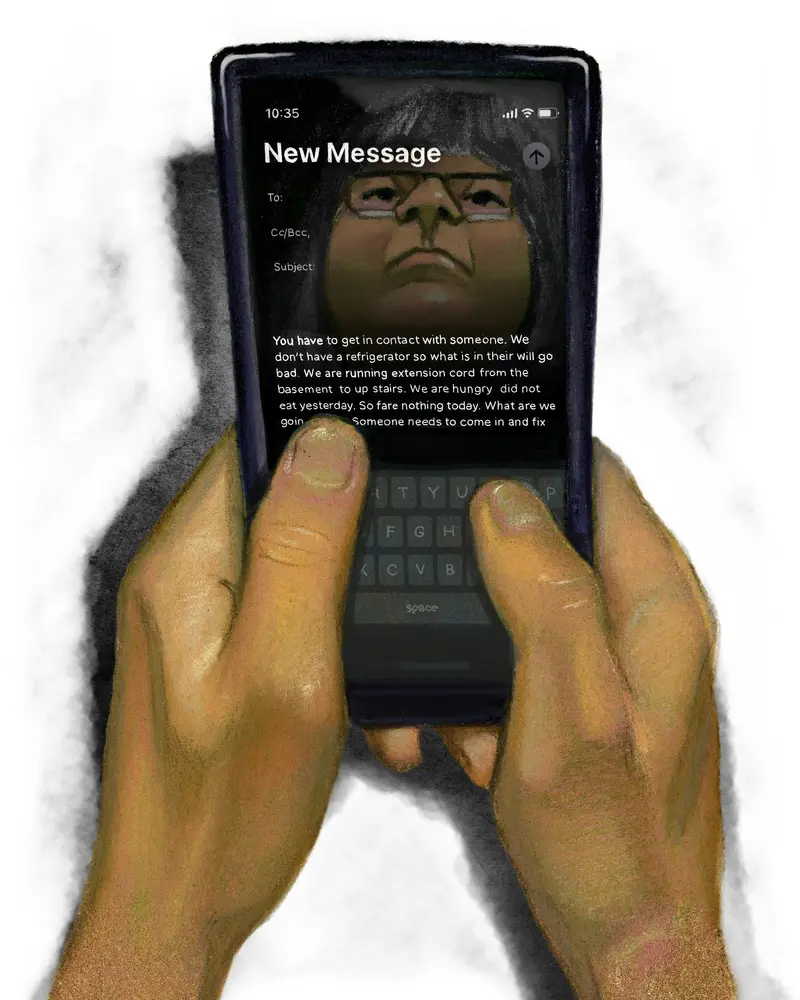
When NYGS failed to act, Zbiegniewicz and her roommates complained to the city, triggering visits from building inspectors, who documented no running hot water and failure to supply adequate heat. That prompted the Department of Housing Preservation and Development to sue the new owner, who agreed to pay fines to settle the lawsuit.
It’s not clear just how much Mayersohn knew about these cases. The siloed nature of New York’s sprawling courts can leave guardianship judges in the dark about significant developments elsewhere in the legal system. That makes the guardian’s report — and the examiner’s review — even more critical for guardianship judges. But neither NYGS nor Zbiegniewicz’s examiner mentioned the escalating legal actions in their reports.
Mayersohn declined to be interviewed, saying judicial ethics opinions barred him from commenting on “any pending case in any jurisdiction,” and he didn’t respond to detailed written questions about his handling of Zbiegniewicz’s case.
Within NYGS, staffers were growing increasingly concerned for Zbiegniewicz’s well-being and passed complaints along to David and Sam Blau, said Billini, the firm’s former case manager. A nurse practitioner for the company confirmed the deplorable conditions on her quarterly visits to the house and reported back to NYGS.
“Client remains angry and frustrated over her living conditions — roaches, mice and rats,” the nurse wrote in notes submitted to the guardianship in February 2019. “There is mold — breathing unhealthy. Would like things to move along.”
And yet, nothing changed, Zbiegniewicz said. (The Blaus did not respond to requests for comment on these claims.)
So in 2019, she started calling Mayersohn’s chambers. She phoned so frequently, she said, that the judge’s secretary knew her case number by heart. But the judge never talked to her when she called, she said. Like the examiner, the secretary sent Zbiegniewicz’s complaints back to the guardianship.
“Once a guardian is appointed, the court’s tendency is to just work with the guardian,” said Joe Rosenberg, who co-directs the CUNY School of Law’s Disability and Aging Justice Clinic. “I think it’s tough to get out of that cycle. And perhaps that’s in part because it’s hard to find another guardian. Things just get locked in.”
The demand for guardians is particularly great among elderly New Yorkers “who are alone, with no one to help, and few or no resources,” the Vera Institute of Justice, a legal reform nonprofit, reported in 2018. And so groups like NYGS fulfill the court’s “greatest need,” said acting state Supreme Court Justice Charles Troia during a panel discussion on guardianships in 2021. “We need agencies that are willing to help those that truly have nothing.”
Other judges, the courts’ spokesperson said, have advocated for structural changes, including replacing nonprofits with “a statewide, state-supported public guardian program for indigent persons.”
But for now, without such an agency to serve poor wards with considerable needs, judges have few other options.
Zbiegniewicz was better able to advocate for herself than wards who have severe health problems, but even she worried that her persistent complaints may have hurt her cause. She said she got the feeling that the judge and lawyers and court staff believed she was unstable and therefore easy to dismiss. “It used to drive me up a wall,” she said of the Article 81 designation attached to her name. “That is a badge saying that I’m cuckoo.”
“This Is My Life and I Want It Back”
After years of turmoil, David Blau notified the court in May 2019 that he had negotiated a resolution to Zbiegniewicz’s five-year-plus housing crisis: The bank would pay her $5,000 to leave Yates Road and NYGS would, in turn, place her in an assisted living facility.
Zbiegniewicz “suffers from a debilitating anxiety disorder and requires assistance with her finances,” Blau asserted in a court petition. The conditions, he argued, necessitated a higher level of care. Billini and other staffers inside NYGS disagreed. Zbiegniewicz and her court-appointed attorney did too.
In a June 2019 filing opposing David Blau’s petition, the attorney informed the court that Zbiegniewcz had already moved out of Yates Road on her own. That month she’d married her longtime friend Leonard Hubbard, and the couple were living together in a city shelter.
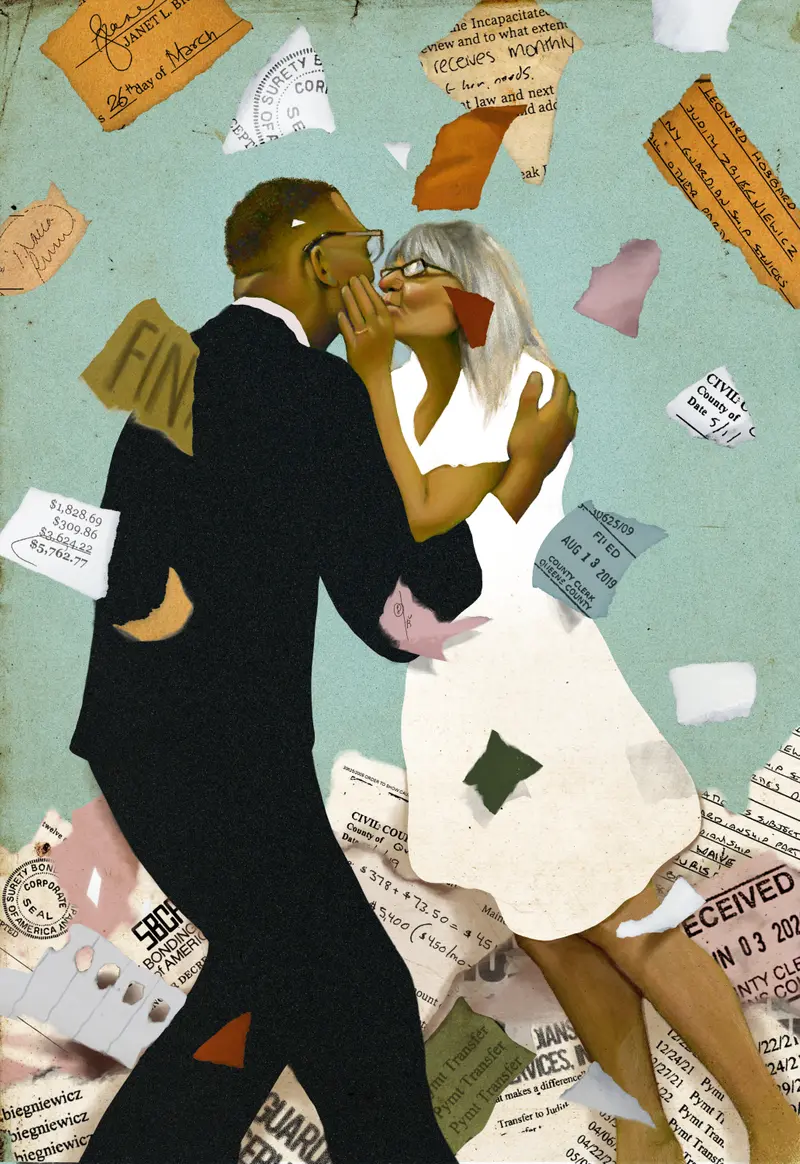
Nevertheless, Mayersohn ordered Zbiegniewicz to find proper housing and ordered NYGS to “support” her in that endeavor. But again, Zbiegniewicz said, the company failed her. She needed her financial records to apply for subsidized housing, but she said NYGS responded slowly to her requests or not at all. She managed to get the records on her own and worked with a social worker at the shelter to secure a new home, she said.
“I need to be in control of my own life and I can’t wait on you to do something, to give me paperwork, to give me this, or anything,” she told David Blau in an Oct. 29, 2020, voicemail. “This is my life and I want it back. Thank you.”
Zbiegniewicz said she never heard back after leaving that message. And because the pandemic shuttered the courts, there were no appearances in her case for more than two years. She was in legal limbo, without any kind of oversight.
“These people do not care about you,” Zbiegniewicz said.
Eventually, she secured a one-bedroom apartment for herself, Hubbard and their new dog, Bogart, in a Long Island City building overlooking the East River for $905 a month. With a housing voucher and public benefits covering two-thirds of the rent, it’s far cheaper than the $1,350 she shelled out each month to live on Yates Road. Ironically, because of an oversight by NYGS, she was able to access her bank account to help pay rent.
Mayersohn finally released Zbiegniewicz from the guardianship in February 2022. In NYGS’ final report, the company disclosed taking $12,551 to cover “unpaid monthly compensation” for the nearly two and a half years she had effectively lived outside the guardianship. The lump sum payment brought the balance of Zbiegniewicz’s accounts to zero.
To date, nobody involved in her case — from NYGS to the examiners who approved the company’s reports — has been held to account. But there is still time for the judge to consider their actions.
Because NYGS failed to file the required paperwork to settle Zbiegniewicz’s account, her case technically remains open. A lawyer for NYGS finally filed that motion in January — two days after ProPublica first contacted the organization for comment on this story. The paperwork now awaits Mayersohn’s signature.
In January, Zbiegniewicz sent a letter to Mayersohn, describing the “injustice and mistreatment” she said she’d endured.
“All I would like is to be heard and for New York Guardianship Services to be held accountable for what they did and did not do for me,” she wrote.
Mayersohn’s secretary confirmed receipt on Jan. 31 but cautioned that, due to a significant backlog, it would take time to resolve her guardianship.

